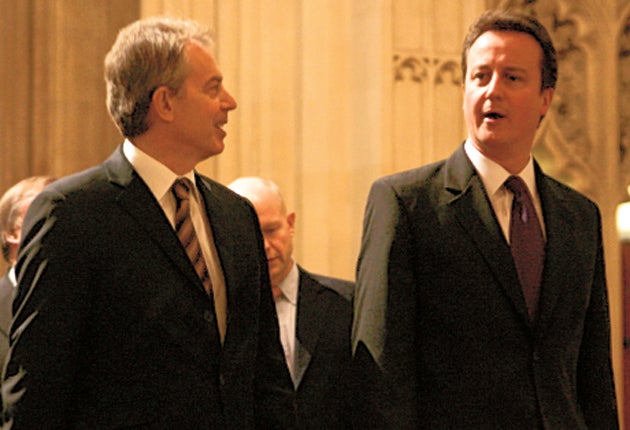Revealed: Blair's secret Chequers talks with Cameron

Your support helps us to tell the story
From reproductive rights to climate change to Big Tech, The Independent is on the ground when the story is developing. Whether it's investigating the financials of Elon Musk's pro-Trump PAC or producing our latest documentary, 'The A Word', which shines a light on the American women fighting for reproductive rights, we know how important it is to parse out the facts from the messaging.
At such a critical moment in US history, we need reporters on the ground. Your donation allows us to keep sending journalists to speak to both sides of the story.
The Independent is trusted by Americans across the entire political spectrum. And unlike many other quality news outlets, we choose not to lock Americans out of our reporting and analysis with paywalls. We believe quality journalism should be available to everyone, paid for by those who can afford it.
Your support makes all the difference.David Cameron is secretly receiving political advice on foreign affairs from Tony Blair – most recently on how to resolve the international deadlock over Palestinian statehood, The Independent has learnt.
Mr Cameron has buried party political loyalties and privately invited the former Labour Prime Minister to Chequers to discuss the impasse, according to Foreign Office sources.
The two men have since stayed in regular touch on the issue, as the Palestinian President, Mahmoud Abbas, prepares to submit a formal application to the United Nations for membership this week. The Chequers meeting was set up at the request of the US Secretary of State Hillary Clinton.
Although Mr Blair is anathema to many on the Conservative benches, Mr Cameron and other ministers admire the former Labour leader's success.
He is a special envoy to the Middle East for "the Quartet" – the UN, the US, the European Union and Russia – but the contacts between Mr Blair and Mr Cameron appear to run counter to protocol. Mr Blair would normally be expected to deal with senior EU figures rather than the leaders of its member states.
The UK Government is agonising over how it should respond. One Whitehall source admitted: "They can't even decide what to do within the Foreign Office." Mr Blair is trying to fashion a united response to the Palestinians' move. The task is daunting, with Israel and the US instinctively hostile to the application, without the Palestinians also agreeing to recognise a Jewish state.
The Foreign Secretary William Hague arrived in New York yesterday, where he was due to meet Mr Blair at Mr Cameron's behest for further talks on the Palestinian situation. Mr Cameron has also been anxious to involve the Liberal Democrats, who have traditionally been more sympathetic to the Palestinian cause, in all discussions. "We need to approach this issue, with all its sensitivities, with a single Coalition voice," said one government source. Insiders say that Mr Blair and Mr Cameron, who held their Chequers meeting in mid-July, have a warm and respectful relationship, although their conversations are limited to international issues, also including Libya and other uprisings in North Africa.
The EU is split on Palestinian recognition, with Germany and the Netherlands preparing to oppose the application, while nations such as France, Spain and Sweden believe it would help to build on the spirit of the Arab Spring.
Mr Blair told the BBC from New York that he was not trying to prevent the Palestinian leaders from lodging their application – either for full UN membership through the UN Security Council, as they currently intend despite a clear threat of a US veto, or for lesser "non-member state" status through the General Assembly, where they are likely to have a built-in majority.
Although the US had earlier been hoping that Mr Abbas would drop the application in favour of direct negotiations, Mr Blair said yesterday: "The Palestinians are perfectly entitled to take their case to the UN, perfectly entitled to have the UN hear it. The real point, however, is whatever happens at the UN, we are in a better place to get a Palestinian state if we also have a revived negotiation."
Mr Blair was unable to persuade Mr Abbas last week that a formula as then drafted had enough elements to allay Mr Abbas's deep scepticism that Israeli Prime Minister Benjamin Netanyahu was serious about negotiations leading to a Palestinian state of the West Bank, Gaza and East Jerusalem. Mr Abbas says he wants negotiations but has been seeking a freeze on Jewish settlement building in the West Bank and a clear declaration the talks will assume a Palestinian state on Israel's 1967 borders.
The Palestinian President acknowledged yesterday that he had come under "tremendous pressure" from the US to opt for negotiations instead of a UN application, but that whatever the outcome of the Quartet's efforts he would be going ahead because there was no "contradiction" between the UN bid and negotiations.
Mr Abbas faces concerted threats from US Congress to halt $500m a year funding to the Palestinian Authority in retaliation for Palestinians' UN application. But critics argue that such a move will jeopardise Israel's security by hitting the salaries of Palestinian security forces.
Join our commenting forum
Join thought-provoking conversations, follow other Independent readers and see their replies
Comments